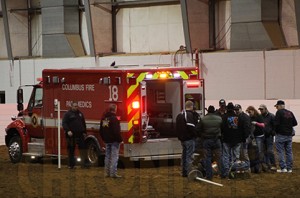Football Gets the Most Attention, But Experts Say to Watch Out For Concussions in Other Sports Like Soccer and Equestrian
 One of our good friends in the horse industry, APHA member, horse show mom, and competitor Dr. Kelly Stille, also happens to be a medical neuropsychologist. Special thanks to Dr. Stille for providing information about the importance of baseline testing, immediate and expert evaluation, and post-concussion management and care.
One of our good friends in the horse industry, APHA member, horse show mom, and competitor Dr. Kelly Stille, also happens to be a medical neuropsychologist. Special thanks to Dr. Stille for providing information about the importance of baseline testing, immediate and expert evaluation, and post-concussion management and care.
Experts advise athletes, coaches, administrators, medical personnel to watch for concussions in soccer, lacrosse, and equestrian events, too.
Colleyville, August, 2014 – Football gets the attention, but seemingly far less violent sports such as soccer, lacrosse and equestrian events each year see significant – and even equal — percentages of athletes suffering concussions. Soccer and lacrosse have shown an incidence rate of concussions per team precisely equivalent to football: 2 to 3 percent. Girls’ lacrosse, for one, sustains the highest number of such brain injuries among all girls’ scholastic sports, and its incidence rate ranks second only to football. That may explain why the American Academy of Pediatrics concluded that the contact found in those sports matches the same physical level as football, boxing and wrestling.
The best prevention in such sports are baseline testing, immediate and expert evaluation, followed by reliable, trained post-concussion management and care, advises medical neuropsychologist, Dr. Kelly Stille, at www.kellystille.net.
Scary fact: Research has shown that neurological deficits post-injury may not be evident on the sidelines and are more likely to have delayed onset of symptoms.
In 2011, Texas House Bill 2038 was passed (also known as Natasha’s Law), which required, among other things, training for coaches and athletic trainers on how to react when players sustain concussions. Under the previous rules, a coach could put students back into a practice or a game if they were symptom-free for 15 minutes. Now, a physician has to give clearance before athletes in any sport can return to the field.
According to the Centers for Disease Control and Prevention, up to 3.8 million sports-related concussions occur in the United States each year. People ages 15 to 19 sustain more concussions than those in most other age groups, and concussions are more damaging to adolescent brains than to adult brains. For example, many do not realize that if a student continues to play with a concussion and receives a second head injury, there is a greater chance of severe brain damage or even death.
A concussion is a disturbance in brain function resulting from a blow to the head/upper body or a violent movement, such as a sudden change in direction. Symptoms may include amnesia, balance or vision issues, fatigue, headache, sensitivity to light or noise, confusion, nausea and, in some cases, loss of consciousness. An athlete with a suspected concussion should NEVER return to the practice/game where he or she was injured, no matter the symptoms’ severity or longevity. Every concussion is dangerous, no matter how seemingly mild. There is no timetable – recovery time varies from person to person.
In order to fully protect every student-athlete, a pre-season neuropsychological baseline assessment should be taken from each athlete. The ImPACT neuropsychological baseline only takes 30-45 minutes to administer. This baseline can then be compared to any potential trauma that might occur during that season.
ImPACT is an independently validated and researched concussion-evaluation system that, over its 15-year history, has become the most widely used and scientifically accepted in the United States. This comprehensive, computerized approach is the standard adopted across the NFL, NHL, Major League Baseball, the Indianapolis Racing League, the U.S. Ski and Snowboard team, college and high-school athletics with roughly 2 million people tested. ImPACT follows a traditional, responsible, medically-based program involving clinics and hospitals as well as certified athletic trainers, nurses, doctors and other medical professionals trained in concussion evaluation and management — with ImPACT providing a portion of that training and consultation. It is the leader in neurocognitive testing, which an international panel of sports-medicine experts recently called the “cornerstone” of proper concussion management.










